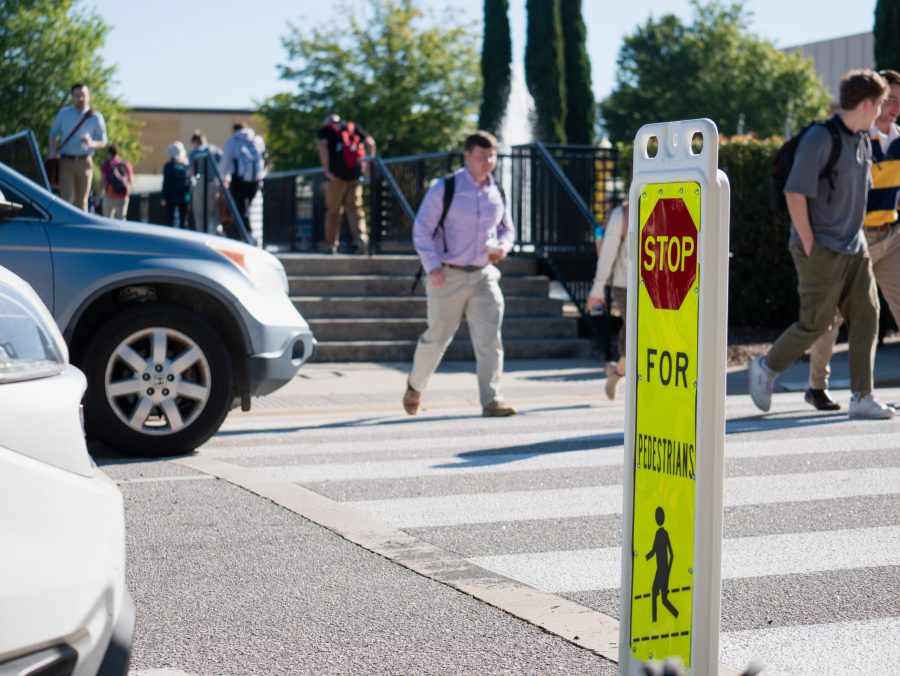Alumni visiting campus this year will immediately notice one of this year’s changes to campus policy: pedestrians now have the right of way. This change comes alongside many smaller changes in the new handbook guidelines for undergraduate students. The changes added more discipleship group meetings, streamlined fine arts attendance requirements and clarified existing policies.
Last spring, the Student Life staff worked with a group of four students to review the entire handbook to update and clarify policies as needed.
Responding to requests from students for more engagement in discipleship groups, the University added an extra meeting time for discipleship groups on Sunday nights at 10:30 p.m.
The handbook also tightened the policy on attendance for the Concert, Opera & Drama Series and other non-class required activities during the semester. “We had to stop and think, are these really part of our educational mission?” director of student life Jon Daulton, said. “The answer that committee came up with was ‘yes,’” he said.
Under the revised policy, students may only miss two non-class required activities due to a conflict with regularly scheduled work. “We placed all of these activities in the calendar of events at the start of the semester so that students have plenty of time to arrange their work schedules accordingly,” Daulton said. “If they are unable to change their work schedule, they may miss a total of two required activities”
For men, the handbook clarifies the guidelines for beards by outlining the definition of “neatly trimmed.” Additionally, guidelines for recreation attire were adjusted and now expect men to wear shorts within 2 inches of knee, the same length as for women.
“Honestly, our lady students expressed concern with the lack of modesty in the style of men’s shorts.” Daulton said. “If we’re going to ask ladies to follow dress expectations out of consideration for their male brothers, then we’re going to ask men to follow dress expectations out of consideration for their female sisters. It ought to work both ways.”
For women, the new guidelines clarify that crop tops are not acceptable and retracted a policy the University piloted last year on a trial basis that allowed women to wear a nose stud. “The provision for a small stud in the nose became difficult to manage,” Daulton said. “If you’re going to have a policy that guides a large group of people, that policy needs to be easily recognizable and easily enforceable. The provision for nose studs simply created more confusion.”
The policies also added sections to clearly explain expectations that were previously implicit, such as a rule prohibiting students from walking behind the residence halls of the opposite gender.
Several of the University’s infraction enforcement measures also changed, such as the prohibition of vulgarity, which can result in a conduct warning or ineligibility.
Many updates came for clarity. “You strive for clarity, you really do, and you find that sometimes your handbook grows because human nature never runs out of creativity,” Daulton said.
The new handbook has information clearly arranged in charts, such as the sections about required events and curfew times. The opening pages of this year’s handbook feature a new Student Development & Discipleship organizational chart visualizing the leadership on campus so students can find out where to find help.
The handbook also outlines distinct reasons students can request to be away overnight and updates the process to obtain one-time and recurring passes. The University also set up a new system for day students to verify who they will stay with off campus.
As needs and trends have changed, BJU has adapted its policies to address current issues while emphasizing the centrality of grace in Christian’s growth. “Enablement to be transformed into [Christ’s] image is found in God’s provision of grace dynamic power to do God’s will,” the introduction to the handbook states. “Through curricular, cocurricular and extracurricular programs, we attempt to cultivate a way of life that challenges potential and points our students toward following Christ. Life skills and positive habits are nurtured through high expectations. Our primary motivation is not mere compliance with regulations but ultimately long-term spiritual success.”






















































